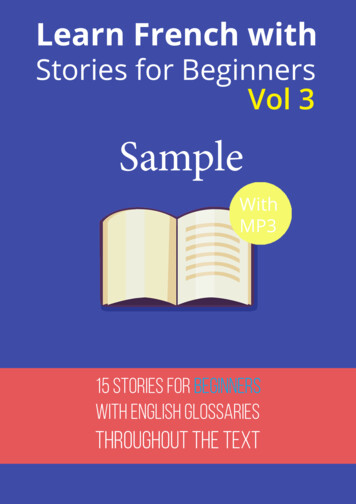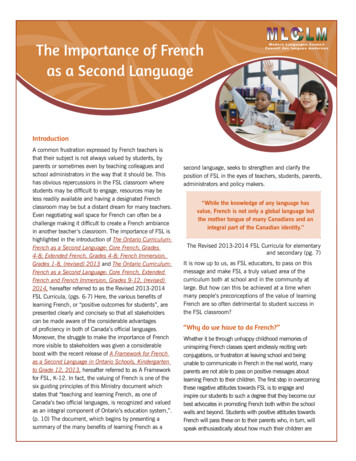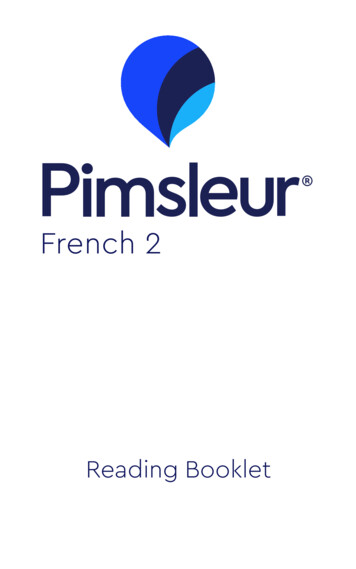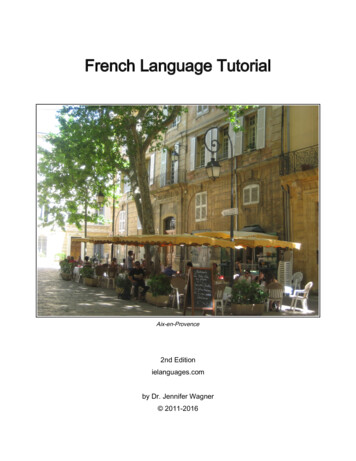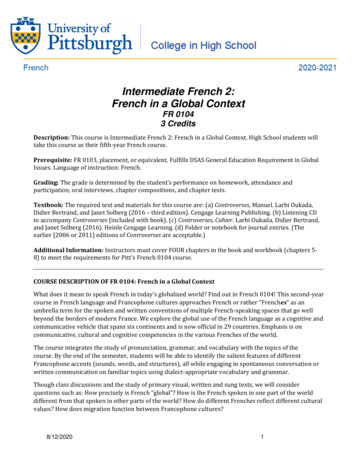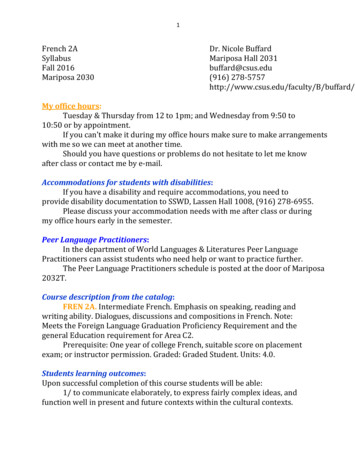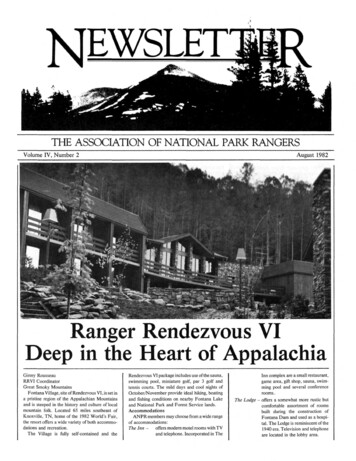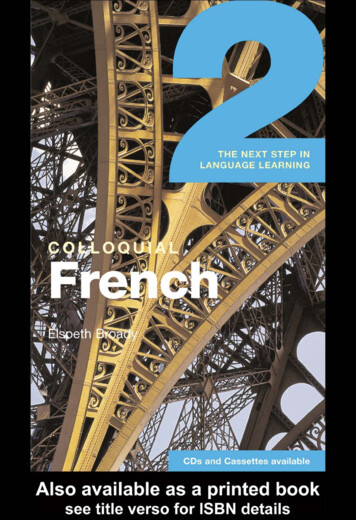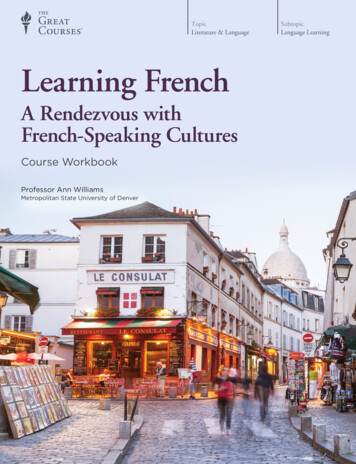
Transcription
TopicLiterature & LanguageLearning FrenchA Rendezvous withFrench-Speaking CulturesCourse WorkbookProfessor Ann WilliamsMetropolitan State University of DenverSubtopicLanguage Learning
PUBLISHED BY:THE GREAT COURSESCorporate Headquarters4840 Westfields Boulevard, Suite 500Chantilly, Virginia 20151-2299Phone: 1-800-832-2412Fax: 703-378-3819www.thegreatcourses.comCopyright The Teaching Company, 2017Printed in the United States of AmericaThis book is in copyright. All rights reserved.Without limiting the rights under copyright reserved above,no part of this publication may be reproduced, stored inor introduced into a retrieval system, or transmitted,in any form, or by any means(electronic, mechanical, photocopying, recording, or otherwise),without the prior written permission ofThe Teaching Company.
ANN WILLIAMS, PH.D.PROFESSOR OF FRENCHMETROPOLITAN STATEUNIVERSITY OF DENVERAnn Williams is a Professor of French at theMetropolitan State University of Denver,where she teaches courses in language, literature, and culture. She earned her Ph.D.from Northwestern University and earned a Diplôme d’études approfondies fromthe Université Lyon 2. In May 2016, Professor Williams was named Chevalier dansl’ordre des Palmes académiques by the French Ministère de l’Éducation nationale.She received the 2013 U.S. Professor of the Year Award for baccalaureate collegesfrom the Council for Advancement of Support and Education and the CarnegieFoundation for the Advancement of Teaching.Professor Williams has coauthored four college-level French textbooks. Sheregularly presents conference papers and writes on contemporary France and theteaching of French. Professor Williams has been involved professionally with theEducational Testing Service, including work as a test developer. Throughouther career, she has received several awards from her university and from foreignlanguage professional organizations. Since 1990, Professor Williams has been anactor with L’Alliance & Co., a French-language theater company in Denver.Professor Williams is an energetic supporter of foreign-language learning andinternational studies, often using her own trajectory to show students how they canbenefit from the experience provided through contact with languages and culturesthat are different from their own. In her teaching and research, she focuses on lifeskills gained through language study: intercultural communication, collaboration,critical thinking, and flexibility.Learning French: A Rendezvous with French-Speaking Culturesi
TABLE OF CONTENTSINTRODUCTIONProfessor Biography .Style Notes . . . . . . .Acknowledgment . .Course Scope . . . . .ivvi1LECTURE GUIDES1Welcome to the French-Speaking World . . . . . . . . . . . . . . . . . . . . . . . . 4Language Lab . . . . . . . . . . . . . . . . . . . . . . . . . . . . . . . . . . . . . . 3422 Ici, on parle français: French Is Spoken Here . . . . . . . . . . . . . . . . . . . . . . 11Language Lab . . . . . . . . . . . . . . . . . . . . . . . . . . . . . . . . . . . . . . 3483French around the World . . . . . . . . . . . . . . . . . . . . . . . . . . . . . . . . .23Language Lab . . . . . . . . . . . . . . . . . . . . . . . . . . . . . . . . . . . . . . 3544 Francophone Towns and Villages . . . . . . . . . . . . . . . . . . . . . . . . . . . . 34Language Lab . . . . . . . . . . . . . . . . . . . . . . . . . . . . . . . . . . . . . . 3605 Weather, Seasons, and Some Geography . . . . . . . . . . . . . . . . . . . . . . . 42Language Lab . . . . . . . . . . . . . . . . . . . . . . . . . . . . . . . . . . . . . . 365TABLE OF CONTENTS6 La Vie en France: Life in France . . . . . . . . . . . . . . . . . . . . . . . . . . . . . 52iiLanguage Lab . . . . . . . . . . . . . . . . . . . . . . . . . . . . . . . . . . . . . .7371Vacations and Leisure Activities . . . . . . . . . . . . . . . . . . . . . . . . . . . . . 64Language Lab . . . . . . . . . . . . . . . . . . . . . . . . . . . . . . . . . . . . . . 3768 À table: Daily Meals . . . . . . . . . . . . . . . . . . . . . . . . . . . . . . . . . . . . . 74Language Lab . . . . . . . . . . . . . . . . . . . . . . . . . . . . . . . . . . . . . . 383
9Buying Groceries . . . . . . . . . . . . . . . . . . . . . . . . . . . . . . . . . . . . . . . 84Language Lab . . . . . . . . . . . . . . . . . . . . . . . . . . . . . . . . . . . . . . 38910 Where to Eat . . . . . . . . . . . . . . . . . . . . . . . . . . . . . . . . . . . . . . . . . 94Language Lab . . . . . . . . . . . . . . . . . . . . . . . . . . . . . . . . . . . . . . 39611 The Life of the Traveler . . . . . . . . . . . . . . . . . . . . . . . . . . . . . . . . . . . 107Language Lab . . . . . . . . . . . . . . . . . . . . . . . . . . . . . . . . . . . . . . 40212 Public Transportation . . . . . . . . . . . . . . . . . . . . . . . . . . . . . . . . . . . . 119Language Lab . . . . . . . . . . . . . . . . . . . . . . . . . . . . . . . . . . . . . . 40813 Travel and Technology . . . . . . . . . . . . . . . . . . . . . . . . . . . . . . . . . . . 130Language Lab . . . . . . . . . . . . . . . . . . . . . . . . . . . . . . . . . . . . . .41614 Souvenirs de voyage . . . . . . . . . . . . . . . . . . . . . . . . . . . . . . . . . . . . 140Language Lab . . . . . . . . . . . . . . . . . . . . . . . . . . . . . . . . . . . . . . 42215 Les Vêtements: How and Why to Dress . . . . . . . . . . . . . . . . . . . . . . . . 151Language Lab . . . . . . . . . . . . . . . . . . . . . . . . . . . . . . . . . . . . . . 42816 The Home and Private Spaces . . . . . . . . . . . . . . . . . . . . . . . . . . . . . 164Language Lab . . . . . . . . . . . . . . . . . . . . . . . . . . . . . . . . . . . . . . 43617 « Je fais des progrès en français ! » . . . . . . . . . . . . . . . . . . . . . . . . . . . 175Language Lab . . . . . . . . . . . . . . . . . . . . . . . . . . . . . . . . . . . . . . 44418 La Musique, le théâtre et la danse . . . . . . . . . . . . . . . . . . . . . . . . . . . . 187Language Lab . . . . . . . . . . . . . . . . . . . . . . . . . . . . . . . . . . . . . . 44919 La Littérature et le cinéma . . . . . . . . . . . . . . . . . . . . . . . . . . . . . . . . 199Language Lab . . . . . . . . . . . . . . . . . . . . . . . . . . . . . . . . . . . . . . 45620 L’Art et les artistes . . . . . . . . . . . . . . . . . . . . . . . . . . . . . . . . . . . . . . 217Language Lab . . . . . . . . . . . . . . . . . . . . . . . . . . . . . . . . . . . . . . 46321 Le Patrimoine: Museums . . . . . . . . . . . . . . . . . . . . . . . . . . . . . . . . .227Language Lab . . . . . . . . . . . . . . . . . . . . . . . . . . . . . . . . . . . . . . 47022 Le Patrimoine: Customs . . . . . . . . . . . . . . . . . . . . . . . . . . . . . . . . . 239Language Lab . . . . . . . . . . . . . . . . . . . . . . . . . . . . . . . . . . . . . . 478Learning French: A Rendezvous with French-Speaking Culturesiii
23 Le Patrimoine: Places to Visit . . . . . . . . . . . . . . . . . . . . . . . . . . . . . . . 251Language Lab . . . . . . . . . . . . . . . . . . . . . . . . . . . . . . . . . . . . . . 48524 Le Tourisme et les régions . . . . . . . . . . . . . . . . . . . . . . . . . . . . . . . 262Language Lab . . . . . . . . . . . . . . . . . . . . . . . . . . . . . . . . . . . . . . 49225 Les Fêtes et les festivals . . . . . . . . . . . . . . . . . . . . . . . . . . . . . . . . .274Language Lab . . . . . . . . . . . . . . . . . . . . . . . . . . . . . . . . . . . . . . 49726 Underlying Cultural Values . . . . . . . . . . . . . . . . . . . . . . . . . . . . . . . 285Language Lab . . . . . . . . . . . . . . . . . . . . . . . . . . . . . . . . . . . . . . 50527 Aventures: Conversation . . . . . . . . . . . . . . . . . . . . . . . . . . . . . . . . . 297Language Lab . . . . . . . . . . . . . . . . . . . . . . . . . . . . . . . . . . . . . . 51028 Aventures: Telling a Story . . . . . . . . . . . . . . . . . . . . . . . . . . . . . . . . 307Language Lab . . . . . . . . . . . . . . . . . . . . . . . . . . . . . . . . . . . . . .51529 Aventures: Reading Cultures . . . . . . . . . . . . . . . . . . . . . . . . . . . . . . . 321Language Lab . . . . . . . . . . . . . . . . . . . . . . . . . . . . . . . . . . . . . . 52030 Your Future with French . . . . . . . . . . . . . . . . . . . . . . . . . . . . . . . . 332Language Lab . . . . . . . . . . . . . . . . . . . . . . . . . . . . . . . . . . . . . . 525SUPPLEMENTARY MATERIALTABLE OF CONTENTSLanguage Labs . . . . . . . . . . . . . . .L’Alphabet phonétique international .Selected Support Materials . . . . . . .Image Credits . . . . . . . . . . . . . . . .iv.341530531534
STYLE NOTESThis workbook uses the following style conventions:¹¹ If a French word or phrase occurs in an otherwise English sentence, it will be bolded. Forexample: To talk about what day it is today, use nous sommes or c’est plus the day.¹¹ For ease of reading, slashes will typically be preceded and followed by a space.¹¹ In some French sentences, English translations of French words and phrases will appear inbrackets if a French word or phrase is new.¹¹ The style for capitalizing French headings, titles, and subheadings is to capitalize the initialletter and lowercase everything else (unless it’s a proper noun). If the text begins with anarticle, like Le / La / L’ or Un / Une, the following word is also capitalized.¹¹ In all-French phrases and sentences, this book will have an extra space after and / or beforequestion marks, exclamation points, colons, semicolons, and quotation marks. HybridFrench-English sentences and phrases will typically use English punctuation rules.Learning French: A Rendezvous with French-Speaking Culturesv
ACKNOWLEDGMENTThis Cahier d’exercices was written byChristian RocheandACKNOWLEDGMENTAnn Williamsvi
LEARNING FRENCHA RENDEZVOUS WITHFRENCH‑SPEAKING CULTURESLearning French can be a great adventure. Perhaps you’re encountering French for the firsttime or perhaps you’ve studied it in the past; in either case, learning French will allow you tojoin over 200 million people from around the world who use it every day. French can give you newways of looking at the world and allow you to engage with cultures where French is spoken. AndFrench has a bright future: It’s projected that 750 million people will be speaking French by 2050.Whether you’re interested in the cultural richness of French-speaking countries or are morefocused on practical preparation for a trip, this course will help you on your way. You’ll learnabout peoples, places, daily life, arts, travel, and history. And you’ll learn to use French in avariety of ways. There is no perfect method that leads to fluency for everybody, but this coursewill give you tools for working with the language. You’ll get experience in listening, reading,writing, and even speaking French.Over the course of 30 lectures, you’ll learn how to pronounce the sounds of French, and you’lluse those sounds in hundreds of useful expressions. You’ll learn to express yourself in the present,past, and future tenses, and you’ll be able to make requests and offer suggestions. You’ll practiceasking and answering questions. You’ll be able to formulate hypotheses in French, describethings and people, and express your opinions. This involves using grammar, but not grammarfor grammar’s sake. Rather, it’s a tool to accomplish communicative tasks.Thirty 15-minute Language Lab audio sessions reinforce new vocabulary and help you practiceFrench pronunciation. You can also practice reading and writing in this Cahier d’exercices,which includes lecture summaries, grammar and verb reviews, and reading comprehension andvocabulary exercises.Language learning is a continuous process, and this course is designed with that in mind. Eachlecture builds on those that came before. If you happen to find something a bit challenging,rest assured that you’ll see it again and have another chance to work on it. You don’t need to gettangled up in the intricacies of grammar.You’ll recycle every structure in different contexts to reinforce what you have learned, even asyou’re learning new material. If you are patient and trust the language-learning process, you canalso enjoy the lectures for their cultural content. You can think through cultural informationand revel in beautiful images of the French-speaking world without worry.Learning French: A Rendezvous with French-Speaking Cultures1
Each lecture is organized around a cultural theme that puts grammar and vocabulary into acontext from the outset. Lectures also use various French-speaking countries to illustrate thethemes. To understand French people, or Senegalese people, or Moroccans, or Quebecers, youneed to understand some of their cultural practices and to know about values that help them todefine who they are. Throughout this course, you’ll decode cultural cues and learn to work withthem as you speak the language. All of this will get easier and easier as you progress through thecourse. Plus, you’ll be able to pause and replay each video lecture—or move on and come back.COURSE SCOPEThis is not “survival French” or “French for travelers.” It’s French for someone who imaginesan authentic contact with language and culture—someone who knows that this contact comesslowly. The course’s goal is that ultimately you’ll read a French book, see a Senegalese film, try aMoroccan dish, or listen to a singer from Quebec and see how connected you’ve become.2
GRAMMAR REVIEW AND ACTIVITIESThis section of the Cahier d’exercices contains two parts.First, you’ll see a brief grammar review section. Révision de grammaire will be limited to afew key points that will help you do the activities that follow it. You may find that you need aFrench grammar book to go beyond the scope of this short review.Following the review, the section entitled Activités will provide several kinds of language practice:1You’ll have the opportunity to review vocabulary and expressions you heard and saw ineach lecture.2 You’ll recycle material from previous lectures when appropriate.3 You’ll practice using the structures from each lecture.4 You’ll practice using key vocabulary in a variety of contexts.5 You’ll develop your reading and writing skills.Learning French: A Rendezvous with French-Speaking Cultures3
LECTURE 1WELCOME TOTHE FRENCHSPEAKING WORLDTLecture 1 Welcome to the French-Speaking Worldhis lecture introduces subject pronouns, verb forms,and useful expressions. Subject pronouns help yourefer to different people, while verbs are the buildingblocks of French sentences. Verbs come in threedifferent tenses: past, present, and future. The presenttense is the subject of this lecture’s material on verbs.4RÉVISION DE GRAMMAIREI. Les Pronoms sujets / Subject PronounsSINGULARPLURALje [I ]nous [we ]tu [ you (informal) ]vous [ you (formal) ]il [he or it ] /elle [she or it ] / on [one ]ils [they (masculine) ] /elles [they (feminine) ]
¹¹ Je contracts to j’ when followed by a vowel.¹¹ Tu, the familiar “you,” demonstrates informality. It indicates closeness and is used amongfriends and family and with children.¹¹ Il is “he” (when referring to a person) or it (when referring to a masculine noun / object).Elle is “she” (when referring to a person) or it (when referring to a feminine noun / object).On is the indefinite subject pronoun (literally, “one”). On can also be used to mean “we,”“they,” “you,” or people in general. Tout le monde means “everyone.”¹¹ You’ll use vous when speaking to a person you don’t know well or anyone to whom youwant to show respect. Vous is also “you” in the plural. It keeps you from having to say “youall” when you are addressing a group of people.¹¹ Ils is “they” for masculine people and nouns. Elles is “they” for feminine people and nouns.Use ils even if there is only one masculine element in the group.II. Les Verbes / Verbs¹¹ Verbs in French are composed of a stem and endings. For now, focus on the endings that areassociated with each subject pronoun. Getting used to the idea of stems endings will makeFrench verbs easier to learn. Verb tenses will help you to talk about the present, the past, andthe future. In Lecture 1, you will learn the present tense.¹¹ A French verb in the present tense can be translated in three ways, depending on the context.Je parle français can mean:I speak French.I do speak French.I am speaking French.III. Les Formes des verbes / Verb Forms¹¹ Some verbs are called regular -er verbs. Parler is a regular -er verb. Many verbs in Frenchfollow this pattern.Learning French: A Rendezvous with French-Speaking Cultures5
PARLER TO SPEAK, TO TALKje parlenous parlonstu parlesvous parlezil / elle / on /tout le monde parleils / elles parlent¹¹ Some verbs in French do not follow a regular pattern. These are presented as irregular verbs.Here’s an example using être, “to be.”Lecture 1 Welcome to the French-Speaking WorldÊTRE TO BE6je suisnous sommestu esvous êtesil / elle / on /tout le monde estils / elles sontACTIVITÉSA. Les Pronoms sujets / Subject PronounsFill in the blanks with one or more of the subject pronouns from the list.je, elle, il, on (same verb ending) / tu / nous / vous / elles, ils (same verb ending)1parlons anglais à Denver.2 parlent français à Casablanca.3 parles anglais à Boston.4 parlez français à Paris.
5 parle anglais.6 suis américain.7sommes américains.8 êtes canadiens.9 est canadienne.10 es américaine.11 sont français.B. La Politesse / PolitenessFill in the blanks with a word or expression from the list.Je m’appelle / Bonjour / aimez / Au revoir / professeure de français / Monsieur /Excusez / EnchantéeAnn: Bonjour, 1 .Pierre: 2 , Madame.Ann:Je m’appelle Anne, et vous ? [what about you? ]Pierre: Je m’appelle Pierre.Ann: 3 .Pierre: Je suis professeur d’anglais, et vous ?Ann: Je suis 4 .Ann: Vous 5 le café ?Pierre: J’adore le café !Learning French: A Rendezvous with French-Speaking Cultures7
Ann regarde sa montre [looks at her watch ].Ann: Oh, moi. J’ai une classe dans 5minutes ! [I have a class in 5 minutes! ]Pierre: Je comprends. 7 , Madame.Ann: Au revoir, 8 .C. Vocabulaire / VocabularyMatch the elements in the right-hand column with the appropriate words in the left.Lecture 1 Welcome to the French-Speaking World18Hello(a)Monsieur2 Ma’am(b)Bonjour3 Sir(c)Madame4 Good-bye(d)Enchanté(e)5 Nice to meet you(e)Au revoirD. Des expressions utiles / Useful ExpressionsMatch the elements in the right-hand column with the appropriate words in the left.1one year(a)de français2 a coffee(b)une université3 a university(c)un an4 a professor(d)un étudiant5 of French(e)un café6 a student(f)un professeur
E. Des phrases complètes / Complete SentencesChoose the correct element to complete the sentence.1Ann travaille {(a) à Denver (b) à Paris (c) à Dakar }.2 Elle {(a) suis (b) sommes (c) est } professeure de français.3 Elle {(a) parle (b) adore (c) est } le café.4 Christian {(a) parlent (b) parles (c) parle } français.5 Ann et Christian {(a) parlent (b) parlons (c) parlez } français et anglais.6 Vous {(a) êtes (b) être (c) est } dans une classe de français virtuelle.F. Questions et réponses / Questions and AnswersLook at the photos and write answers to the questions in French.112 Madame de Sévigné ? Elle est française ou américaine ?2 Elle est française ou américaine ?Learning French: A Rendezvous with French-Speaking Cultures9
BONNE RÉPONSESA. Les Pronoms sujets / Subject Pronouns1 Nous 2 Ils / Elles 3 Tu 4 Vous 5 Je / Il / Elle6 Je 7 Nous 8 Vous 9 Elle 10 Tu 11 IlsB. La Politesse / Politeness1 Monsieur 2 Bonjour 3 Enchantée 4 professeure de français5 aimez 6 excusez 7 Au revoir 8 MonsieurC. Vocabulaire / Vocabulary1 (b) Bonjour 2 (c) Madame 3 (a) Monsieur 4 (e) Au revoir 5 (d) Enchanté(e)Lecture 1 Welcome to the French-Speaking WorldD. Des expressions utiles / Useful Expressions101 (c) un an 2 (e) un café 3 (b) une université 4 (f) un professeur5 (a) de français 6 (d) un étudiantE. Des phrases complètes / Complete Sentences1 (a) à Denver 2 (c) est 3 (b) adore 4 (c) parle 5 (a) parlent 6 (a) êtesF. Questions et réponses / Questions and Answers1Elle est française.2 Elle est française et américaine.
LECTURE 2ICI, ON PARLEFRANÇAIS: FRENCHIS SPOKEN HEREThis lecture is particularly rich in grammar andvocabulary. The goal is to give you several toolsto interact with the language as quickly as possible. Itis best to do the following material and activities overseveral sessions. Don’t try to absorb it all at once. Itwill come in time. The same material will be recycled insubsequent sections of the Cahier d’exercices.RÉVISION DE GRAMMAIREI. Le Genre des noms / The Gender of Nouns¹¹ In French, all nouns are either masculine or feminine. The grammatical gender of a nounreflects an essential feature of that noun only when one is talking about people or animals.¹¹ There are some patterns that can help you. For example, most nouns ending in -ion arefeminine and most ending in -ment are masculine. But when you learn new words, thiscourse recommends that you learn them with the indefinite article, sometimes translatedas “a.”Learning French: A Rendezvous with French-Speaking Cultures11
II. Les Articles indefinis et définis / Indefinite and Definite Articles¹¹ In French, you will almost always need an article or other modifier with each noun you use.¹¹ Un is the masculine indefinite article.¹¹ Une is the feminine indefinite article.¹¹ Des is the plural for both.¹¹ Le, la, and les are the definite articles in French, signaling masculine, feminine, and plural,respectively. Sometimes these are translated as “the,” but in English the article is not alwaysneeded. Le and la become l’ before a vowel and most words beginning with the letter h.¹¹ As an example, “I like France” translates to “J’aime la France.”III. L es langues, nationalités et adjectifs de nationalité /Languages, Nationalities, and Adjectives of NationalityLecture 2 Ici, on parle français: French Is Spoken Here¹¹ In French, capitalize the names of countries. Also capitalize nouns of nationality. Here aretwo examples:12J’aime le Maroc.Mohamed? C’est un Marocain.¹¹ Don’t, however, capitalize adjectives of nationality:Mohamed? Il est marocain. Il aime les livres marocains.Mohamed? He’s Moroccan. He likes Moroccan books.¹¹ And finally, don’t capitalize languages:Nous parlons français.
IV. I ntroduction à « C’est » / « Ce Sont » et « Il y a » /Introduction to “C’est” / “Ce sont” and “Il y a”¹¹ C’est (it is, he is, she is) and ce sont (they are) are used to talk about people and things. Fornow, just use them when you want to identify or define something:C’est une table.Ann? C’est une prof.C’est une prof d’anglais? Non, c’est une prof de français.¹¹ Il y a is used to say “there is” or “there are.” It’s for describing:Sur la table, il y a des livres.V. Les Verbes / Verbs¹¹ Lecture 2 introduces the present tense of regular -er verbs. They are conjugated like parlerfrom Lecture 1. You will see a list of -er verbs in the Language Lab. Here is an example ofhow they are conjugated:CHERCHER TO LOOK FORje cherchenous cherchonstu cherchesvous cherchezil / elle / on chercheils / elles cherchentJe cherche un restaurant. [I am looking for a restaurant. ] Note that “for” is included in the verb itself.Learning French: A Rendezvous with French-Speaking Cultures13
Verbs Used with an Infinitive¹¹ If you conjugate a verb like aimer, détester, or adorer and add an infinitive, you expressthings you like to do and don’t like to do:J’aime parler français.Je déteste travailler.J’adore visiter le Sénégal.VI. La Négation / NegationMaking a Verb Negative¹¹ To make a sentence with one verb negative, put ne and pas around the conjugated verb.Lecture 2 Ici, on parle français: French Is Spoken HereJe ne parle pas japonais.14¹¹ To make a sentence with a verb infinitive negative, put the ne and the pas around theconjugated verb and then add the infinitive.Nous n’aimons pas parler anglais.Articles in Negative Sentences¹¹ In negative sentences, definite articles do not change.J’aime les restaurants américains, mais je n’aime pas les restaurants fast-food.¹¹ The article stays the same: les. In the above example, the restaurants are there; this speakerdoesn’t like one kind. Here’s another example:Nous aimons le Luxembourg. Mais nous ne visitons pas le Luxembourg.
¹¹ Indefinite articles often do change. With il y a and many more expressions, un, une, anddes become de or d’ in the negative.Sur la table, il y a des livres, une carte et un téléphone. Il n’y a pas de fleurs.¹¹ However, with c’est un, c’est une, and ce sont des, the article remains the same. One wayto remember is that the thing exists. You’re negating its definition.C’est un livre. Ce n’est pas un crocodile.Ce sont des Français. Ce ne sont pas des Américains.ACTIVITÉSA. Chez Juliette et Marc / At Juliette and Marc’sUse the indications in parentheses (m. masculine, f. feminine, m. pl. masculineplural, and f. pl. feminine plural) to complete this description of some items in Julietteand Marc’s apartment and some people in their lives. Use the indefinite articles un, une,or des.Juliette et Marc, 1 amis de Christian, habitent dans 2appartement (m.) à Paris. Sur 3 table (f.), il y a 4 livres,(m. pl.) 5 fleurs (f. pl) et 6 portable (m.). Elle adoreparler avec 7 amis (m. pl.) français et américains. 8 amieaméricaine de Juliette s’appelle Ann. Oui, c’est moi !Learning French: A Rendezvous with French-Speaking Cultures15
B. Chez Juliette et Marc / At Juliette and Marc’sNow give the definite articles needed for the items and people mentioned in section A.1des :5 des :2 un :6 un :3 une :74 des :8 une :des :C. Q u’est-ce qu’il n’y a pas chez Marc et Juliette ? /What Isn’t at Marc and Juliette’s?Give a negative answer to the questions. Follow the model.Lecture 2 Ici, on parle français: French Is Spoken HereModèle : Il y a une télévision ?16Non, il n’y a pas de télévision.1 Il y a un crocodile ?2 Il y a des vidéocassettes ?3 Il y a une photo du président français ?
D. Visites et conversations / Visits and ConversationsSelect the correct verb to form a logical sentence.1Je {(a) parle (b) travaille (c) décide } français au Maroc.2 Nous {(a) invitons (b) parlons (c) visitons } le Sénégal.3 Les touristes américains {(a) travaillent (b) cherchent (c) parlent } la Tour Eiffel.4 Vous {(a) écoutez (b) travaillez (c) parlez } la musique française.5 Tu {(a) trouves (b) habites (c) penses } en France ?6 Tout le monde {(a) parle (b) pense (c) regarde } les monuments historiques.E. Ici, on parle français / French Is Spoken HereThink about some of the cultural and linguistic questions raised in Lecture 2 by fillingin the blank with the appropropriate form of the verb in braces. New terms will havetranslations in square brackets.Le Maroc, la Tunisie et l’Algérie 1 {être } trois pays intéressants.On 2 { parler } français, arabe et les langues berbères.Les touristes 3 {visiter } le Maroc avec plaisir !Ils 4 {trouver } les Marocains très sympas [very nice ]. Et vous ?Vous 5 {chercher } un pays pour un voyage fantastique ?Je 6 { penser } que le Maroc 7 {être } super !Mon mari [husband ] et moi, nous 8 {étudier } l’arabe marocainmais c’ 9 {être } difficile.Learning French: A Rendezvous with French-Speaking Cultures17
F. Des activités intéressantes / Interesting ActivitiesUse the correct form of aimer or détester the infinitive of the verb to explain what thesetravelers like and don’t like to do. Use the icon as your clue.1Denise visiter Paris 2 Tu parler anglais 3 Paola et Francesco regarder des livres. 4 Nous étudier le français. 5 Je travailler. 6 Vous écouter la professeure de français ? Lecture 2 Ici, on parle français: French Is Spoken HereG. Des activités intéressantes ? / Interesting activities?18Use the correct form of the verb in the negative to explain what these people don’t do.Please follow the model.Modèle : Les étudiants paresseux [lazy ] {regarder } le Cahier d’exercices.Les étudiants paresseux ne regardent pas le Cahier d’exercices.1 Christian et Lucie {visiter } Paris.2 Tu { parler } anglais en France.
3 Nous {étudier } le japonais4 Je {travailler }.5 Vous {écouter } la professeure de français ?H. J’aime / Je n’aime pasSay what these people don’t like to do. Follow the model.Modèle : Virginie {aimer } écouter la musique rap.Virginie n’aime pas écouter la musique rap.1 Catherine et Paul {aimer } visiter
¹ In all-French phrases and sentences, this book will have an extra space after and / or before question marks, exclamation points, colons, semicolons, and quotation marks. Hybrid French-English sentences and phrases will typically use English punctuation rules. Learning French: A Rendezvous with French-Speaking Cultures v
